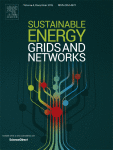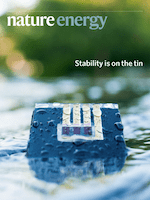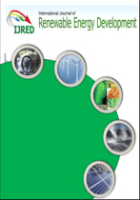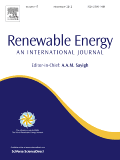
Energy Strategy Reviews
Scope & Guideline
Exploring innovative strategies in the energy landscape.
Introduction
Aims and Scopes
- Sustainable Energy Transition:
The journal emphasizes the transition to sustainable energy systems, exploring various pathways including renewables, energy efficiency, and decarbonization strategies across different regions and sectors. - Techno-Economic Analyses:
A significant focus on techno-economic assessments of energy technologies, evaluating their feasibility, cost-effectiveness, and impacts on energy systems. - Policy Analysis and Governance:
Investigating the role of public policies, governance frameworks, and regulatory environments in shaping energy markets and facilitating transitions to low-carbon economies. - Integration of Renewable Energy Sources:
Research on the integration of various renewable energy sources into existing energy systems, addressing challenges related to grid stability, energy storage, and distributed generation. - Energy Security and Geopolitics:
Exploring the implications of geopolitical factors on energy security, including the dynamics of energy imports, exports, and the role of international cooperation. - Socio-Economic Impacts of Energy Systems:
Analysis of the socio-economic dimensions of energy systems, including equity, access, and community engagement in energy transitions.
Trending and Emerging
- Hydrogen Economy:
There is a growing focus on hydrogen as a versatile energy carrier, with studies exploring its production, storage, and integration into existing energy systems. - Digitalization and Smart Grids:
Emerging themes around the role of digital technologies in enhancing energy efficiency, demand response, and the management of renewable energy sources are gaining momentum. - Community Energy and Local Solutions:
Research on community-led energy initiatives, including energy cooperatives and local energy planning, is increasingly prominent, reflecting a shift towards grassroots energy solutions. - Climate Change Mitigation Strategies:
A surge in studies addressing comprehensive strategies for mitigating climate change impacts through energy transitions, highlighting urgency and innovative approaches. - Environmental, Social and Governance (ESG) Factors:
The integration of ESG considerations in energy projects is becoming a focal point, emphasizing sustainable investment and corporate responsibility in energy transitions. - Energy Resilience and Adaptation:
Research on enhancing energy system resilience against climate impacts and geopolitical uncertainties is trending, focusing on adaptive strategies for future energy security.
Declining or Waning
- Conventional Fossil Fuel Analysis:
There is a noticeable decrease in studies focused on conventional fossil fuel systems, as the journal shifts towards more sustainable and renewable energy solutions. - Traditional Energy Market Structures:
Research on traditional energy market structures, such as centralized fossil fuel-based grids, is becoming less prevalent as discussions around decentralized and smart grid solutions gain traction. - Impact of Energy Prices on Economic Growth:
The exploration of the direct impacts of energy prices on economic growth appears to be waning, with a shift towards understanding broader socio-economic and environmental implications. - Niche Energy Technologies:
Specific niche technologies that do not align with broader sustainability goals are receiving less focus, reflecting a trend towards more impactful and scalable solutions. - Environmental Degradation Linked to Energy Production:
Studies linking energy production directly to environmental degradation are declining, as the journal increasingly emphasizes integrated approaches to sustainability.
Similar Journals

Sustainable Energy Grids & Networks
Elevating Knowledge in Energy Integration and TechnologySustainable Energy Grids & Networks, published by ELSEVIER, stands at the forefront of research in energy systems, contributing significantly to the fields of Control and Systems Engineering, Electrical and Electronic Engineering, and Energy Engineering and Power Technology. With an impressive impact factor, this journal is ranked in the top quartile (Q1) for key engineering categories, affirming its authority and influence within the academic community. The journal is dedicated to publishing high-quality research focused on the sustainable integration of energy systems and smart grid technology, which is crucial in addressing the pressing challenges of climate change and energy consumption. Although it operates on a subscription model, the rigorous peer-review process ensures that only the most innovative and impactful studies are disseminated, promoting advancements in renewable energy and sustainability. As a critical resource for researchers, professionals, and students, Sustainable Energy Grids & Networks provides a platform for the exchange of ideas that drive the future of sustainable energy solutions, fostering collaboration and knowledge-sharing across disciplines.

Progress in Energy
Leading the Charge in Energy Research and DevelopmentProgress in Energy, published by IOP Publishing Ltd, is an esteemed open-access journal that focuses on cutting-edge research in the field of energy. With its e-ISSN 2516-1083, this journal stands out for its commitment to disseminating high-quality articles that aim to advance the understanding and application of energy technologies and policies. Juggling respectably in the academic arena, it proudly holds a Q1 classification in the energy (miscellaneous) category and ranks 6th out of 73 in the general energy sector, placing it in the top 92nd percentile among its peers, according to Scopus metrics. The journal's scope encompasses a wide range of topics, including renewable energy, energy efficiency, and policy analysis, making it a vital resource for researchers, industry professionals, and students alike. With a publication horizon extending from 2019 to 2024, Progress in Energy invites contributions that push the boundaries of knowledge in energy fundamentals and innovations.

Nature Energy
Leading the charge in energy technology and sustainability research.Nature Energy is a leading academic journal focused on the multidisciplinary field of energy research, published by NATURE PORTFOLIO. Since its inception in 2016, the journal has rapidly established itself as a key platform for innovative research on energy technologies, sustainable practices, and advancements in renewable energy sources. With an impressive impact factor and consistently ranked in the Q1 category across various disciplines, including Electronic, Optical and Magnetic Materials, Energy Engineering, and Fuel Technology, Nature Energy attracts a global audience of researchers and professionals committed to addressing the pressing energy challenges of our time. Its Scopus rankings highlight its exceptional standing in the field, with leading positions in Energy Engineering and Renewable Energy categories, underscoring its importance in shaping future energy strategies. For those looking to contribute to the discourse on sustainable energy solutions, Nature Energy offers an engaging avenue for dissemination of cutting-edge research and innovative ideas.

International Journal of Renewable Energy Development-IJRED
Championing Research for a Sustainable TomorrowThe International Journal of Renewable Energy Development (IJRED), published by DIPONEGORO University in Indonesia, serves as a pivotal platform for scholarly research in the dynamic fields of renewable energy and sustainability. With a dedication to advancing knowledge since its inception in 2012, IJRED has embraced an Open Access model, ensuring that vital research is freely accessible to a global audience. The journal's impressive impact factor and its classification in the Q2 and Q3 quartiles across multiple categories—including Energy Engineering and Power Technology, Environmental Engineering, and Renewable Energy, Sustainability and the Environment—underscore its significance and authority in contemporary energy discourse. Indexed in Scopus, the journal consistently ranks among the top-tier publications, making it an essential resource for researchers, professionals, and students committed to innovating sustainable solutions in the face of climate challenges. Researchers are invited to contribute to this essential body of work as the journal continues to converge impactful research until 2024.

Journal of Energy in Southern Africa
Fostering Dialogue on Energy Sustainability and InnovationJournal of Energy in Southern Africa is a distinguished peer-reviewed publication dedicated to the dissemination of research and innovation in the energy sector, particularly within the Southern African context. Published by the University of Cape Town's Energy Research Centre, this open-access journal has been providing a platform for scholarly exchange since 1993, with a renewed commitment to accessible research since 2016. With an ISSN of 1021-447X and an E-ISSN of 2413-3051, it serves as a crucial resource for researchers, professionals, and students interested in advancing their understanding of energy production, sustainability, and policy in the region. The journal is currently ranked in the Q3 category for Computer Science and Energy in the 2023 metrics and has established a solid position in Scopus rankings, highlighting its contribution to the fields of General Computer Science and General Energy. Located in Cape Town, South Africa, the journal not only fosters local research but also encourages a broader international dialogue on energy challenges and solutions. Researchers and practitioners are invited to contribute their findings and case studies, making the journal an essential tool for anyone looking to engage with pressing energy issues.

Economics of Energy & Environmental Policy
Connecting Economic Principles with Environmental Impact.Economics of Energy & Environmental Policy is a prestigious journal published by the International Association for Energy Economics, focusing on the intersection of economic principles and energy/environmental policy. Since its inception in 2012, this journal has provided a critical platform for researchers, professionals, and students interested in the multifaceted impacts of energy economics on society and the environment. With an impressive performance reflected in its 2023 Scopus rankings—Q2 in key areas such as Economics and Econometrics, Energy, and Management, Monitoring, Policy and Law—this journal not only contributes to academic discourse but also informs policymaking and industry practices. Although published as a traditional journal, its contents are vital for addressing contemporary challenges in energy management and environmental sustainability. Located in Cleveland, Ohio, the journal is committed to fostering innovation in energy economics, enhancing our understanding of the socio-economic dimensions of energy use, and promoting effective environmental policymaking.

Problemele Energeticii Regionale
Transforming Energy Discourse through Open Access KnowledgeProblemele Energeticii Regionale is a notable academic journal focused on the field of energy engineering and sustainable energy solutions, published by the Institute of Power Engineering, Academy of Sciences of Moldova. Since its inception in 2005, this Open Access journal has become a significant platform for disseminating research and innovations in various energy-related domains, including renewable solutions, fuel technology, and energy sustainability. While its impact factor metrics suggest it currently resides in the Q4 quartile category across multiple scopes—such as Energy Engineering, Power Technology, and Renewable Energy—it provides critical insights that can pave the way for advancements in regional energy challenges. Researchers, professionals, and students alike will find this journal an essential resource for understanding and contributing to the ongoing discourse in the energy sector. With its commitment to accessibility and knowledge sharing, Problemele Energeticii Regionale aims to foster a collaborative and informed community focused on energy innovation and sustainability.

International Journal of Power and Energy Systems
Exploring the Dynamics of Power and EnergyInternational Journal of Power and Energy Systems, published by ACTA PRESS, serves as a vital platform for research and discourse in the multifaceted fields of applied mathematics, electrical and electronic engineering, and energy engineering. With an ISSN of 1078-3466 and an E-ISSN of 1710-2243, this journal covers a broad spectrum of topics pertinent to power and energy systems, showcasing innovative research from its inception in 1996 through to its projected contributions in 2024. Operating from Calgary, Canada, the journal, though not currently open access, provides invaluable insights into the challenges and advancements within these domains, as reflected in its categorization in the Q4 quartile across multiple indices. Despite being positioned in lower output percentiles in 2023 rankings on Scopus—specifically, #212 in Energy Engineering and Power Technology—it remains a critical resource for scholars seeking to expand the frontiers of knowledge in energy sustainability and system efficiency. Researchers, professionals, and students alike will find the journal’s commitment to fostering academic dialogue and disseminating pioneering results both essential and inspiring.

Smart Energy
Unlocking Knowledge for a Sustainable Energy FutureSmart Energy, an esteemed publication by ELSEVIER, stands at the forefront of energy research, exploring innovative solutions and sustainability practices in the energy sector. With an impressive Open Access model since its inception in 2021, this journal has rapidly established itself as a vital resource for researchers and professionals alike, providing unrestricted access to high-quality peer-reviewed articles. Positioned in the Q1 category across multiple fields, including Energy Engineering and Power Technology, Renewable Energy, and Management, Monitoring, Policy and Law, Smart Energy demonstrates a strong commitment to advancing knowledge in the energy domain. Registered under the ISSN 2666-9552, it garners significant attention, ranking within the top ranges of Scopus metrics across various disciplines. The journal continuously aims to bridge the gap between academic research and practical application, making it an essential outlet for scholars and practitioners dedicated to fostering sustainable energy solutions worldwide. Located in the United Kingdom, Smart Energy is shaping the future of energy management from its publishing base in Amsterdam, the Netherlands.

Renewable Energy
Transforming Ideas into Sustainable Solutions.Renewable Energy is a prestigious international journal published by PERGAMON-ELSEVIER SCIENCE LTD, dedicated to advancing the field of renewable energy technologies and their applications. Since its inception in 1991, this journal has provided a critical platform for researchers, professionals, and students to explore innovative solutions in renewable energy, sustainability, and environmental protection. With an impressive impact factor and ranked in the top quartile (Q1) of its category, Renewable Energy is recognized for its high-quality, peer-reviewed research that significantly contributes to the scientific and professional discourse in the sector. The journal is indexed in Scopus, holding an esteemed rank of #21 out of 270 in its field, underscoring its influence and reach. Researchers can access the journal’s articles through traditional subscriptions, ensuring a broad dissemination of vital knowledge that supports the global transition to sustainable energy sources. Addressed from its headquarters in Oxford, England, Renewable Energy is crucial for anyone involved in the journey towards a sustainable future, fostering collaboration and innovation in a critical area of environmental science.